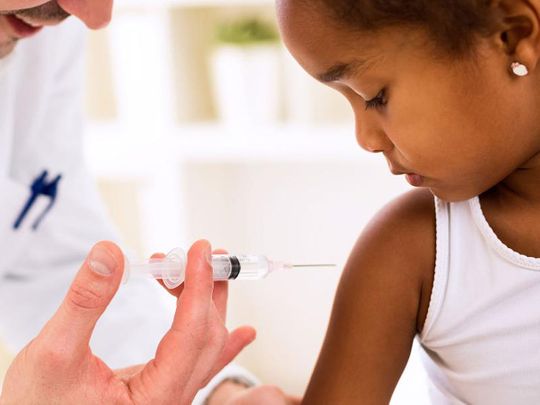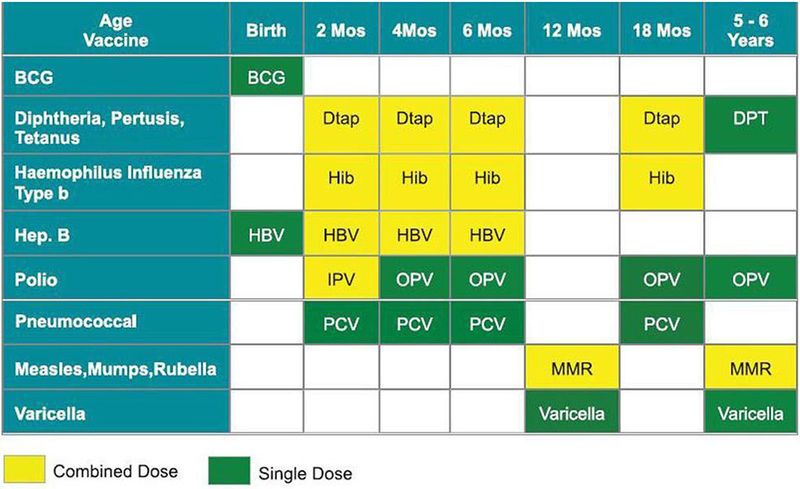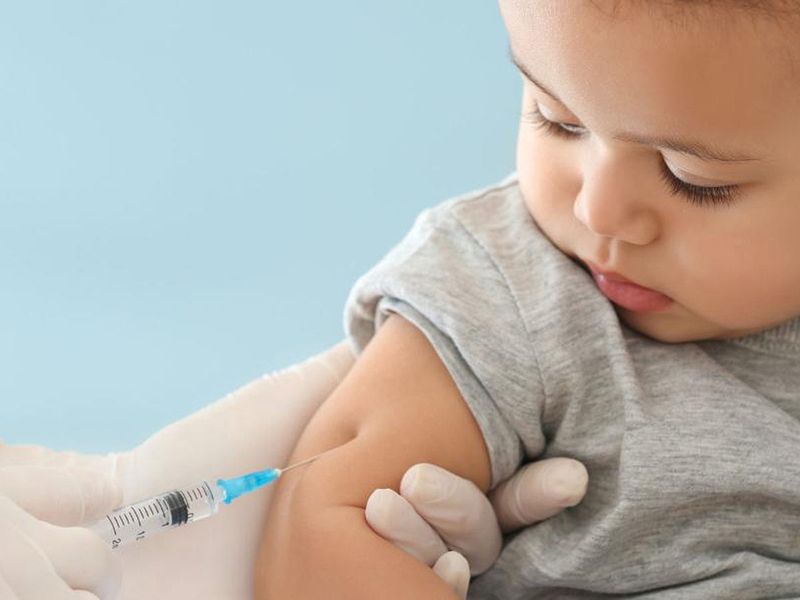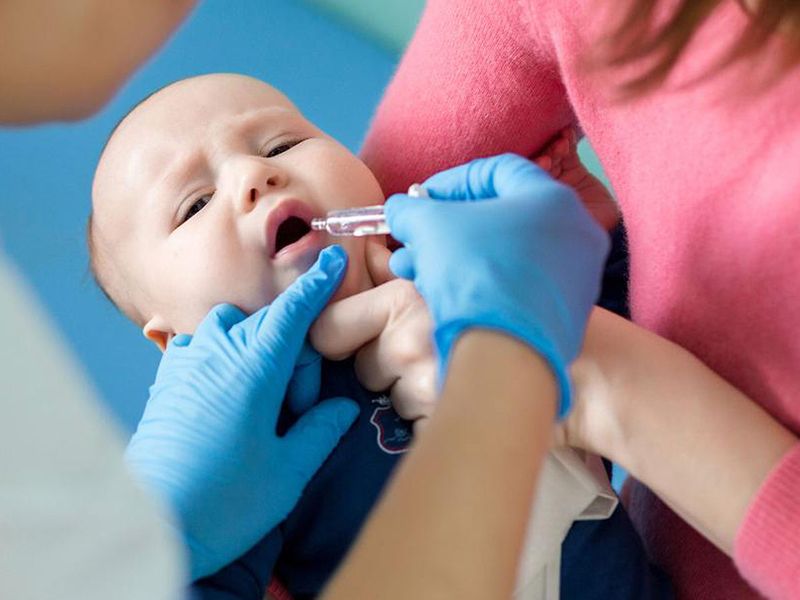
The pandemic has brought into sharp focus the importance of vaccinations for keeping serious and deadly diseases under control. While the COVID vaccine is currently only approved for use on children aged 16 years and over in the UAE, there are many other vaccinations that are available to children, and it's more important than ever to ensure that your child's immunisations are up to date to help protect them and the community against other diseases that pose a risk to your little one's health.
While it may seem cruel because needles are involved, vaccinating your child against disease is one of the kindest and most important things that you can do as a parent. “It is estimated that 2.5 million child deaths from diphtheria, tetanus, pertussis and measles are prevented each year thanks to vaccination programmes around the world,” says Dr Richard Jones, a UK-qualified GP and family doctor based in Dubai. “Serious diseases such as small pox have already been eradicated and there have been dramatic reductions in the number of cases of polio and measles.”
What is a vaccine?
Most currently available childhood vaccines contain the same antigens or parts of antigens that cause diseases, but the antigens in vaccines are either killed or greatly weakened. When they are injected into fatty tissue muscle, vaccines cause immune system to produce antibodies against them. The memory cells that remain prevent re-infection when they encounter that disease in the future, making your child immune to potentially fatal diseases.
“Before vaccines, many children died from diseases such as whooping cough, measles, polio and meningitis, says Dr Jones. “Immunisations are safe and save lives. There is no evidence to support long term issues or conditions occurring because of immunisations.”
What is the vaccination schedule in Dubai?
Immunisation schedules are different depending on where you live in the world. This is because in some areas the risk of getting certain infections is higher; for example, the risk of getting TB in the UAE is different to the risk of it in some parts of Europe, so it’s recommended for all babies born in the UAE to be immunised against TB in the first few days of birth. For expats this can sometimes cause complications in terms of what has been given in one place and what is needed after re-location.
The Dubai Health Authority introduced the first comprehensive immunisation services policy for the Emirate of Dubai in January 2012.
It is important that you follow the vaccination schedule of the country in which you are living, rather than where you are from, because they vary depending on the disease activity in your area.
Will your child's vaccinations be covered by your medical insurance?
The schedule in Dubai:
While this is the schedule recommended by the Dubai Health Authority, your own clinic or doctor's schedule may vary slightly, or include other, optional recommended vaccines.

However squeamish you may be about causing your little one slight pain in the short term, feel confident in the fact that you are helping to safeguard not only their life, but the lives of other children and people in your community.
Here, Dr Richard Jones answers some of the main worries parents tend to have about vaccinations, gives more information on what is being immunised against, and answers common FAQs….
Can a vaccine give you the disease?
The are two main types of vaccine that are commonly administered to children in the UAE - ‘live’ (tiny dose of the real disease) or ‘dead’ (inactivated).
With live vaccines the answer is almost certainly not, but sometimes a person will develop what looks like a mild form of the disease (i.e. measles), the full-blown disease is extremely unlikely. It is impossible to get the disease from inactivated vaccines.
Can my child’s immune system cope with all the vaccines advised?
Yes. A baby is exposed to thousands of viruses and bacteria from birth which their immune system deals with admirably, often without any sign of illness.
The immune system is under constant attack by many viruses on a daily basis. The few vaccines currently given, around 16 for children in Dubai, compared to the number of viruses the immune system can deal with, is minute.
Do vaccines cause autism or sudden infant death syndrome (SIDS)?
Millions of vaccines have been given to children over the last 50 years globally and there is no medical or scientific evidence, from thousands of worldwide independent studies, to support any long-term detrimental effects.
The main risks associated with vaccines are the side effects, which are almost always mild. These can include fever, redness and swelling at the injection site, but they normally go away within a few days. Serious side effects after vaccination, such as a severe allergic reaction (1 in 1,000,000) are very rare. Doctors and clinic staff are trained to deal with them.
What happens if I the schedule has not been followed (for example due to illness)?
In most cases this is not a big deal. There are ‘catch up’ schedules we follow. Discuss with your doctor.
What about Meningitis B?
The Meningitis B vaccine is offered in countries such as the UK as part of the national immunisation program (given at 8 weeks, 16 weeks and 1 year). The meningitis vaccine is not licenced for use in the UAE but you can pay to get it privately in Britain, but remember you need two doses at least two months apart. If it is possible for you to organise the injections I would recommend it.
In Dubai, as well as having the Men ACWY vaccine, children are also protected from two of the most common causes of meningitis through the Hib and PCV vaccines.
I have seen DTaP and DTwP, are they the same?
Pertussis vaccines are either whole cell (wP), meaning that the vaccine contains the entire pertussis organism or acellular (aP), meaning that the vaccine contains only a part of the pertussis organism. Depending on the type of Pertussis component, DTP vaccines are called DTwP or DTaP respectively.
DTaP is preferred to DTwP in children, with a history of allergy to previous doses of DTwP or, suffering from neurological disorders.
I never had childhood vaccinations myself - is there anything I can do about it now?
It is never too late. It is advised you get fully vaccinated regardless of age.
Read more: '7 Things to know about vaccinations in Dubai'
What is my child being immunised against?
Learn more about each individual vaccine and the diseases that they are protecting against...
BCG
The chance of contracting the serious bacterial lung infection TB (tuberculosis) in the Middle East is higher than in many other countries in Europe for example, so it is recommended for babies of any origin living in Dubai to have this vaccine in the first few days after birth.
Hepatitis B (HBV)
Hepatitis B is a major cause of serious liver disease. The younger someone is when they get hepatitis B disease, the worse the consequences. Children do not show symptoms like adults do. If infected at a young age, children are more likely to go undiagnosed and become a chronic carrier of the virus. Chronic carriers have lifelong problems and issues from this infection. The vaccine is inactivated and cannot cause Hepatitis B disease.

Diptheria, Pertussis, Tetanus (DTP/DTaP)
DTaP is a vaccine which helps children under seven develop immunity to three deadly diseases caused by bacteria: diptheria, tetanus and whooping cough (pertussis).
Diptheria is a respiratory disease that can cause breathing problems, paralysis, heart failure and death. It is highly contagious and is spread by coughing and sneezing.
Tetanus, or lockjaw, is caused by a bacterium often found in soil. It attacks the nervous system, causing muscle spasms and death if left untreated.
Pertussis causes severe coughing spasms which lead to difficulties eating, drinking and even breathing. It is highly contagious and can lead to pneumonia, seizures, brain damage and death.
Haemophilus Influenza Type B (Hib)
This vaccine gives long-term protection against Haemophilus influenza Type B and those who are immunised are also protected against Hib meningitis, pneumonia, pericarditis (an infection of the membrane surrounding the heart), as well as bacterial infections of the blood, bones and joints.
Rotavirus
Rotavirus protects against the rotavirus infection which causes diarrhoea and vomiting in young children. This vaccine is administered orally.
Polio (IPV/OPV)
Poliomyelitis (polio) is a serious illness that is caused by a virus. There has been a dramatic reduction in cases of polio since routine vaccination was introduced in the mid-1950s. According to the World Health Organization the United Arab Emirates has been polio-free since 1992.
But the infection has not been completely eradicated in some parts of the world, including Pakistan, Afghanistan and Nigeria, and there remains a small risk it could be re-introduced in countries where it has been eradicated, especially given the increase in international travel.
Most people with polio won’t have any symptoms and will not know they are infected. In a small number of cases, the polio virus attacks the nerves in the spine and base of the brain. This can cause paralysis which is usually temporary. However, a few people with the infection are left with muscle weakness, shrinking of the muscles, tight joints and deformities including twisted feet or legs.
This is why it is so important to make sure you and your children are fully vaccinated against it.
Measles, Mumps Rubella (MMR)
Measles, mumps and rubella (German measles) are highly infections conditions that can have serious, potentially fatal complications, such as meningitis, swelling of the brain and deafness. They can also lead to complications in pregnancy that affect the unborn baby and can lead to miscarriage.
And, although the weight of scientific evidence shows that MMR is safe, some parents continue to have concerns and opt to give their child single vaccinations. This is unnecessary and serves simply to subject your child to three times more pain. A paper written by a former British doctor in 1998, which suggested a link between the MMR vaccine and autism, has since been discredited. There is absolutely no medical or scientific evidence to back this up at all.
Pneumococcal (PCV)
The pneumococcal vaccine protects against serious and potentially fatal pneumococcal infections which are cause by the bacterium Streptococcus pneumoniae. They can lead to pneumonia, septicaemia and meningitis.
The Pneumococcal conjugate vaccine (PCV) is used to vaccinate children under 2-years-old in Dubai. It is known by the brand name Prevanar 13.

Meningitis ACWY Conjugate
The UAE is a high-risk area for meningococcal disease. Nimenrix is our vaccine of choice as it protects against 4 serotypes of Neisseria meningitidis (A,C,Y,W-135).
Hepatitis A
Hepatitis A is a form of viral hepatitis transmitted in food, causing fever and jaundice. Living in the middle east / Asia I would strongly recommend this as the risk of coming into contact with people who have travelled to parts of the world where hepatitis A is widespread, such as sub-Saharan and north African countries and the Indian subcontinent (particularly India, Bangladesh, Pakistan and Nepal) is high.
Varicella
The Varicella vaccine, which protects children against chicken pox is routinely given to children in Dubai after their first birthday, with a booster given when they are six. In the UK, it is not included in the immunisations programme and there are divided opinions on whether it is completely necessary.
Chickenpox is generally a mild illness in children. As you get older is becomes increasingly severe. I recommend the vaccine at around 5 years old if your child has not had chickenpox by then.
Chicken pox can be a nasty illness but complications are rare and children normally recover quickly.
Typhoid
Vaccination is strongly recommended if you are planning to travel to countries where sanitation and food hygiene are likely to be poor or if you are likely to come into contact with people who have been to these places. Most people who get typhoid fever develop it while visiting India, Pakistan or Bangladesh.
There are two main vaccines:
- Vi vaccine – given as a single injection
- Ty21a vaccine – given as 3 capsules to take on alternate days.
Combined typhoid and hepatitis a injections are also available for people aged 15 or over. Protection against hepatitis A lasts 1 year and protection against typhoid lasts 3 years.
Dr Richard Jones is a British family medicine doctor (GP) who treats both children and adults. He also specialises in sport and exercise medicine.








